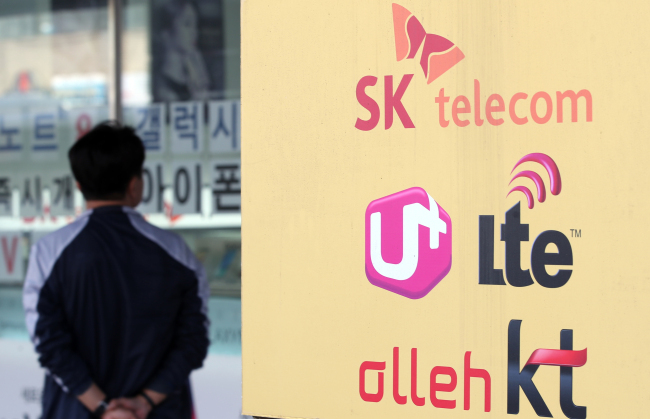[News Focus] Mobile operators speed up 5G commercialization after allocation
By Song Su-hyunPublished : June 19, 2018 - 17:10
South Korea’s three mobile operators are speeding up their plans to commercialize fifth-generation network services after the completion of the auction for 5G frequency bands.
According to the plans, the mobile carriers are preparing to select equipment vendors in the third quarter and start building 5G stations in the fourth quarter.
“Some are expecting the vendor selection to be completed by early July,” said an industry official. “Now with the frequency auction being completed, each company will focus on discussing details regarding development of equipment that will be suitable for the positions and amounts of frequency blocks they purchased.”
SK Telecom, KT and LG Uplus -- in the order of their market share -- have received bids from global equipment vendors, including Nokia, Ericsson-LG, Samsung Electronics and Huawei.
After choosing equipment builders, the telcos will work with them to establish 5G network stations across the country.
According to the plans, the mobile carriers are preparing to select equipment vendors in the third quarter and start building 5G stations in the fourth quarter.
“Some are expecting the vendor selection to be completed by early July,” said an industry official. “Now with the frequency auction being completed, each company will focus on discussing details regarding development of equipment that will be suitable for the positions and amounts of frequency blocks they purchased.”
SK Telecom, KT and LG Uplus -- in the order of their market share -- have received bids from global equipment vendors, including Nokia, Ericsson-LG, Samsung Electronics and Huawei.
After choosing equipment builders, the telcos will work with them to establish 5G network stations across the country.

SKT and Nokia on Tuesday said the two held a demonstration of end-to-end data transmission based on the 3GPP 5G standards at Nokia’s research center in Poland.
“The success of the latest demonstration in compliance with the global standards means that SKT can take the lead in 5G commercialization,” said SKT CTO Park Jin-hyo. “The company will now accelerate plans to launch the first 5G-enabled phones and network establishment.”
During a two-day auction that ended Monday, SKT won the 100 megahertz between 3.6 and 3.7 gigahertz band, which is positioned at the top of the auctioned 3.5 GHz band.
The blocks SKT bought are considered the most desirable for 5G services, with the least noise and interruptions from other frequency bands because of the position, the company said.
KT took 100 MHz placed in the middle of the band between 3.5 and 3.6 GHz.
“The bandwidth we secured is considered a global standard for 5G services,” a KT official said. “We have saved about 30 billion won by winning this spectrum, and we will now start works to align equipment, software and chipsets.”
The country’s smallest LG Uplus ended up with the lowest 80 MHz between 3.42 and 3.5 GHz, which could experience some noise from below frequency bands, according to some industry officials.
“The company secured the smallest amount, but later on, it could move to seek more, if the government decides to sell the remaining 20 MHz,” an official said.
Compared to the competitive 3.5 GHz band, the three equally took 800 MHz of the 28 GHz band, which is expected to be used for 5G services much later than the 3.5 GHz.
“By fully utilizing the allocated frequencies, LG Uplus will refrain from marketing competition over the 5G speed or frequency bandwidth,” it said. “We will make leading efforts to establish 5G equipment and provide differentiated 5G services.”
The newly acquired 3.5 GHz and 28 GHz frequencies will be available for use by around December.
Launches of 5G-enbaled devices are expected to take place in January, while 5G mobile services are forecast to go commercial in March, according to the telecom industry.
By Song Su-hyun (song@heraldcorp.com)

















![[KH Explains] Hyundai's full hybrid edge to pay off amid slow transition to pure EVs](http://res.heraldm.com/phpwas/restmb_idxmake.php?idx=652&simg=/content/image/2024/04/18/20240418050645_0.jpg&u=20240418181020)

![[Today’s K-pop] Zico drops snippet of collaboration with Jennie](http://res.heraldm.com/phpwas/restmb_idxmake.php?idx=642&simg=/content/image/2024/04/18/20240418050702_0.jpg&u=)